Pharaoh
Ancient Egypt meets Sim City
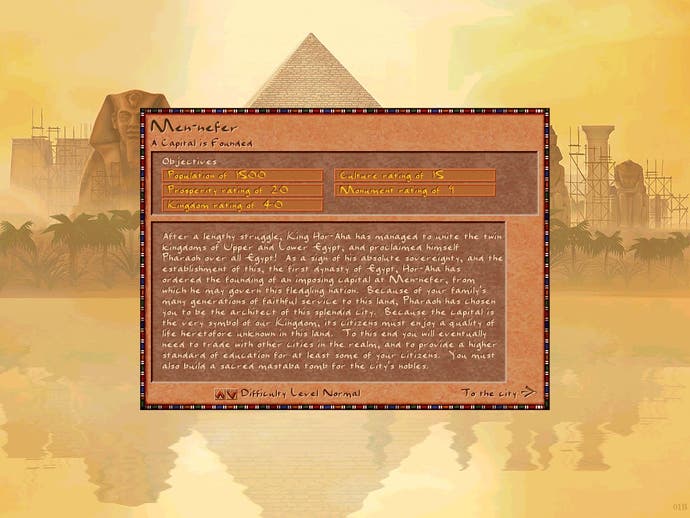
Mission : Bloody Difficult
For several years now Impressions Games have been making something of a reputation for themselves with the "Caesar" series of games, essentially transplanting the idea behind SimCity into classical Rome.
The latest in the series was Caesar III, but apparently after releasing the game Impressions decided it was time for a change of scenery. And so we come to Pharaoh, powered by the same engine as Caesar III, but this time set in ancient Egypt.
The idea is simple enough - you are given a limited amount of money ("Debens") and some land, and left to build a city.
The main part of the game is a campaign which takes you through thousands of years of Egyptian history, from the first primitive towns through to the building of the Great Pyramid and beyond.
The missions that make up the campaign send you all over Egypt, building up new towns and cities, and achieving specific aims such as constructing a monument, or reaching a certain cultural level. This gives the game a slightly less free-style feel than SimCity, as you have definite targets to meet.
For those of you who prefer being left to your own devices to build the city of your dreams, Pharaoh also includes several stand-alone missions outside of the main campaign, a few of which are open-ended with no victory conditions to interupt your play.
In fact, even in the missions which you can win the game gives you the option of ruling the city for a few more years after your victory, if you feel you have unfinished business there.
Unfortunately, unlike SimCity, there is no random map feature in Pharaoh - you are limited to playing the standard campaign and the handful of stand-alone missions. Luckily though, many of those missions can take you days to complete...
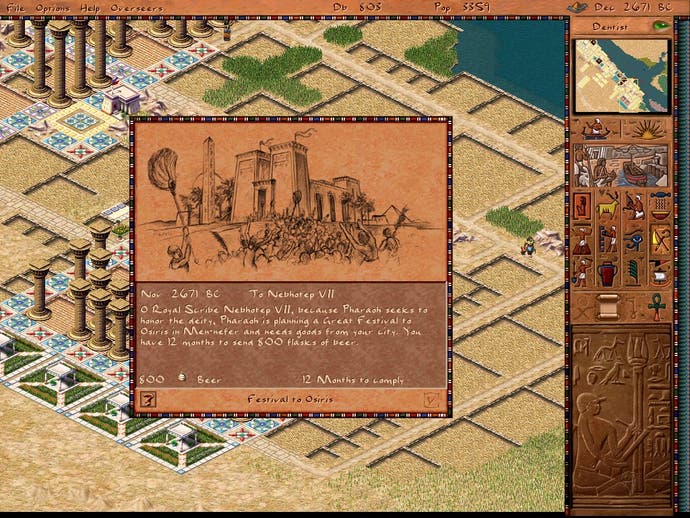
Getting Started
Managing an entire city is a complex and tedious job at times, and one which I'm happy to admit I still haven't mastered.
To start you need somewhere for your people to live. These housing plots need to have access to the main road passing through the area so that immigrants can reach them. They also need a water supply.
Once you have people living in your city you need to find them something to do - unemployment leads to poverty and crime. You will need to build farms to feed your people, work camps to house the labourers, granaries to store the food in, and bazaars to distribute the food amongst your people.
The farms rely on the river Nile's annual floods to fertilize them, and to ensure that the floods are regular and cover all your farmlands each year you will need to please the god Osiris, which requires temples, shrines, and a festival square.
Meanwhile you need a palace and tax collectors offices to allow you to pay for all these buildings. You need firehouses to stop the city burning down, and architects posts to keep your buildings from collapsing.
If you want your city to develop into a better place to live, you will also need entertainment (in the form of jugglers, musicians and dancers), as well as essential goods such as linen, pottery, and of course .. beer!
Yes, beer was an important part of ancient Egyptian culture. You will need farms to grow barley and breweries to turn it into beer, and then more bazaars to distribute the beer amongst your people.
Create a city that looks like an outsized Heineken factory and you will start to build up a surplus of beer, which you can then trade with other cities in many of the missions, along with every other type of goods from bricks and stone to jewelry and weapons.
And that's just the basics...
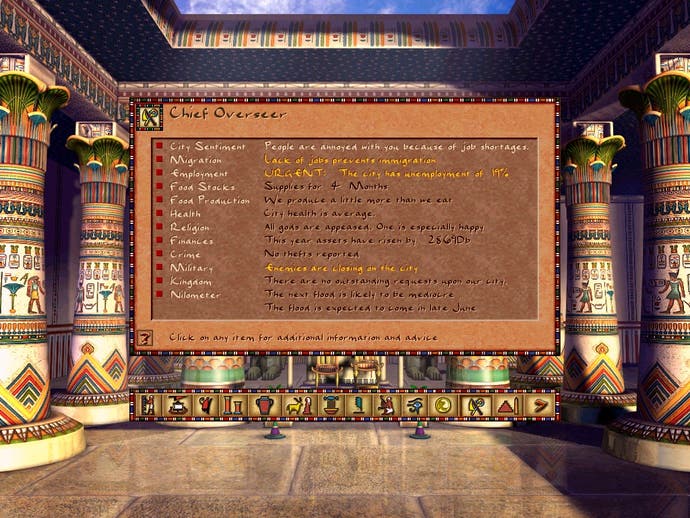
On A Losing Streak
Luckily there are a range of advisors who will keep you informed on important details like how popular you are with the gods, what employment problems you have, and the contents of your treasury.
You can also find out more information by clicking on your people, who will whine if they are hungry, don't get enough entertainment, or are worried about the wrath of the gods. Clicking on many buildings will also give you information, about how many people live or work there, and if they are short on any goods they require.
There are also a series of "overlay" options which allow you to see variations in crime levels, structural soundness, fire risks, entertainment levels, desirability and much more across your city.
As you might have guessed by now, Pharaoh has an almost anal attention to detail. Building, trading, and management are all important, and if you let your city slip it becomes increasingly difficult to recover.
If you are in debt for too long the Pharaoh may decide to invade your city and take the money you owe him by force. Allow your emergency services to decay and you may see vast swathes of your beautiful city collapsing into rubble, burning to the ground, or dying from plague or malaria.
Fail to build up a sufficient military force and rival kingdoms may attack and loot your city. Upset the gods and they will seek vengeance, destroying buildings and causing harvests to fail.
There are many ways to lose this game, and nothing is more painful than seeing your city collapse around you after hours of hard work. On the other hand, there is a definite sense of satisfaction from creating a beautiful and efficient city.
Unfortunately your city rarely runs smoothly and efficiently, however well you design it...
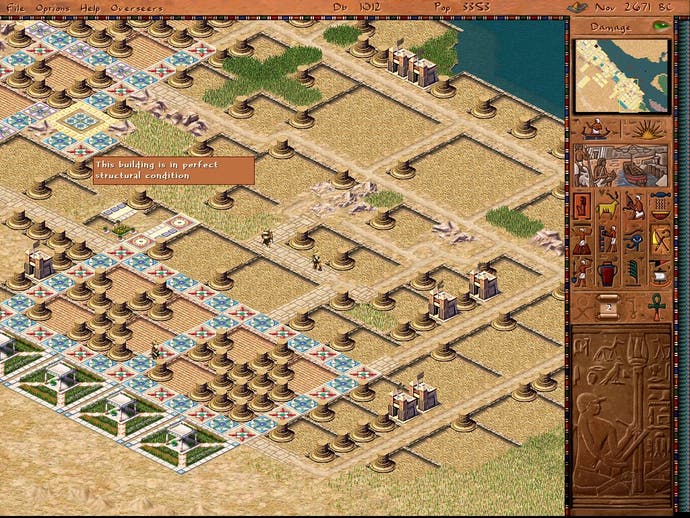
Walker
The problem is the "walker" system that Pharaoh uses. Whereas in SimCity simply plopping a police station into the middle of a crime black spot will cause a reduction in the local crime level, in Pharaoh it isn't that simple.
The whole game revolves around "walkers", people who wander around the streets of your city. Firehouses produce walkers that reduce the risk of buildings they pass catching fire, tax collectors make sure that everyone around them are paying their taxes, and doctors prevent outbreaks of plague and malaria.
It's a great idea, but unfortunately it just doesn't work. Why not? Because the walkers are stupid. Brainless, literally. Every time they come to a crossroads they merely pick at random which way to go.
This means that through sheer bad luck entire sections of your city can find themselves cut off from food and water, simply because the walkers supplying them randomly decided to go a different way.
More than once I have lost entire blocks of my city to fire and disease because my walkers for some reason ignored that district. I once saw a group of houses devolving into a slum because of a "lack of access to religious facilities", despite being surrounded by no less than half a dozen temples!
The walker system is a great idea in theory, but sadly in practice its implementation is terrible. All Impressions needed to do was give them a modicum of Artificial Intelligence, for example making them tend to head towards the areas that needed them most, but instead they have left them to wander aimlessly around the streets of your city.
Ironically this means that the worse the road system in your city, the more efficient the walkers are. They reach less intersections, so they take less random choices, so you have more control over where they go. Which is ridiculous.
In a vain attempt to solve this, Pharaoh introduces roadblocks which you can place on your roads to prevent any walkers passing that spot. Again, a nice idea (though it would have been nice if they had actually fixed the problem instead of trying to bodge a labour intensive way for the player to get around it), but it doesn't work in practice.
Roadblocks stop all walkers indiscriminately, making them virtually useless in practice. For example, if you put a roadblock up to stop your doctors wasting their time wandering around in the fields, it also blocks your foremen from finding workers for the farms.
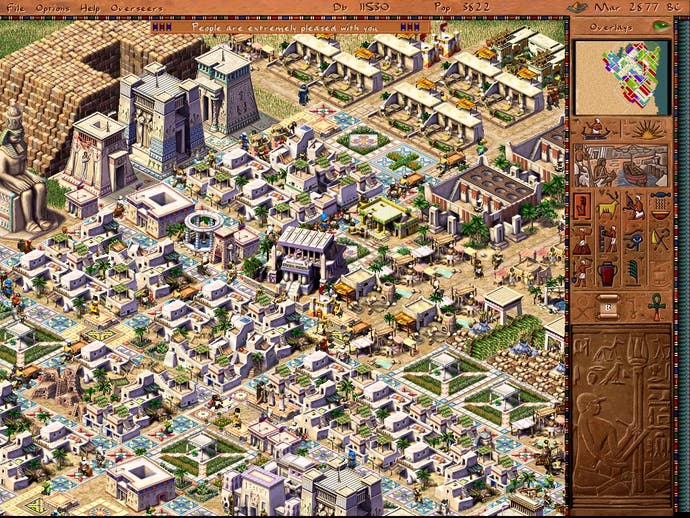
Conclusion
Pharaoh is a deep, involving, good looking, (more or less) historically accurate, educational, fun, and downright addictive strategy game.
Unfortunately, given the hideously broken nature of the walker system I just can't recommend it to anybody but the most hardened sim fans. Governing a city when you have little or no control over your subjects is frustrating at best, and more than once I have had to restart a mission due entirely to the stupidity of my walkers.
If you can overlook these problems, then go out and buy this game now. But if like me you like the computer to show some vague signs of intelligence, then avoid it at all costs!
Pharaoh will take over your life, and then leave you foaming at the mouth and pulling your hair out in frustration whenever something goes wrong...
Eye Candy
Download The Demo
Try before you buy! Download the Pharaoh demo (53Mb) now!







